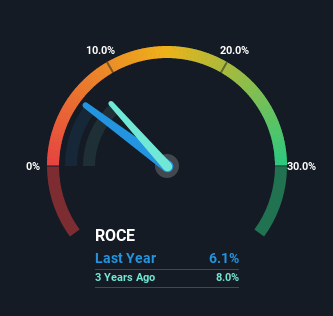Finding a business that has the potential to grow substantially is not easy, but it is possible if we look at a few key financial metrics. One common approach is to try and find a company with returns on capital employed (ROCE) that are increasing, in conjunction with a growing amount of capital employed. If you see this, it typically means it's a company with a great business model and plenty of profitable reinvestment opportunities. However, after investigating Duni (STO:DUNI), we don't think it's current trends fit the mold of a multi-bagger.
Understanding Return On Capital Employed (ROCE)
For those who don't know, ROCE is a measure of a company's yearly pre-tax profit (its return), relative to the capital employed in the business. Analysts use this formula to calculate it for Duni:
Return on Capital Employed = Earnings Before Interest and Tax (EBIT) ÷ (Total Assets - Current Liabilities)
0.061 = kr333m ÷ (kr7.3b - kr1.9b) (Based on the trailing twelve months to March 2023).
So, Duni has an ROCE of 6.1%. In absolute terms, that's a low return but it's around the Consumer Durables industry average of 7.3%.
See our latest analysis for Duni

Historical performance is a great place to start when researching a stock so above you can see the gauge for Duni's ROCE against it's prior returns. If you'd like to look at how Duni has performed in the past in other metrics, you can view this free graph of past earnings, revenue and cash flow.
What Can We Tell From Duni's ROCE Trend?
When we looked at the ROCE trend at Duni, we didn't gain much confidence. To be more specific, ROCE has fallen from 12% over the last five years. However, given capital employed and revenue have both increased it appears that the business is currently pursuing growth, at the consequence of short term returns. If these investments prove successful, this can bode very well for long term stock performance.
The Bottom Line
While returns have fallen for Duni in recent times, we're encouraged to see that sales are growing and that the business is reinvesting in its operations. However, total returns to shareholders over the last five years have been flat, which could indicate these growth trends potentially aren't accounted for yet by investors. So we think it'd be worthwhile to look further into this stock given the trends look encouraging.
Duni does come with some risks though, we found 2 warning signs in our investment analysis, and 1 of those is potentially serious...
While Duni may not currently earn the highest returns, we've compiled a list of companies that currently earn more than 25% return on equity. Check out this free list here.
New: Manage All Your Stock Portfolios in One Place
We've created the ultimate portfolio companion for stock investors, and it's free.
• Connect an unlimited number of Portfolios and see your total in one currency
• Be alerted to new Warning Signs or Risks via email or mobile
• Track the Fair Value of your stocks
Have feedback on this article? Concerned about the content? Get in touch with us directly. Alternatively, email editorial-team (at) simplywallst.com.
This article by Simply Wall St is general in nature. We provide commentary based on historical data and analyst forecasts only using an unbiased methodology and our articles are not intended to be financial advice. It does not constitute a recommendation to buy or sell any stock, and does not take account of your objectives, or your financial situation. We aim to bring you long-term focused analysis driven by fundamental data. Note that our analysis may not factor in the latest price-sensitive company announcements or qualitative material. Simply Wall St has no position in any stocks mentioned.
About OM:DUNI
Duni
Develops, manufactures, and sells concepts and products for the serving, take-away, and packaging of meals in Sweden, Poland, and internationally.
Flawless balance sheet with solid track record and pays a dividend.
Market Insights
Community Narratives


Recently Updated Narratives


Alphabet: The Under-appreciated Compounder Hiding in Plain Sight


MINISO's fair value is projected at 26.69 with an anticipated PE ratio shift of 20x


The Quiet Giant That Became AI’s Power Grid
Popular Narratives


The company that turned a verb into a global necessity and basically runs the modern internet, digital ads, smartphones, maps, and AI.


MicroVision will explode future revenue by 380.37% with a vision towards success



